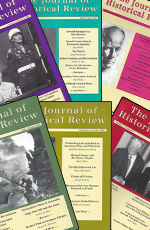Points of Friction
Joseph Sobran is a nationally-syndicated columnist, lecturer, author (most recently of Alias Shakespeare), and editor of the monthly newsletter Sobran's (P.O. Box 1383, Vienna, VA 22183). “Free Speech (Slightly Abridged)” is reprinted from the May 1996 issue of Sobran's, and “Double Standard” is reprinted from the April 1996 Sobran's. Free Speech (Slightly Abridged) If there…

